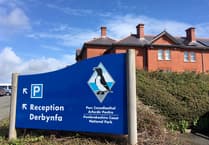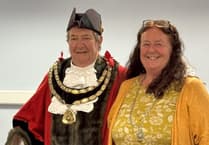Sir,
My acquaintance with Clovers Open-Air Theatre started in 1934, when one morning together with my neighbour Donald Hullah, both of us then aged 10, I was exploring along the north shore. The tide was low and we were able to round the first and second points without difficulty and to cross the next bay to Bowman's Point.
Here we scrambled up the boulders and, looking above us, saw that there was a footpath climbing the headland to the top of the cliff. We followed it and came out, to our surprise, into a little open-air theatre.
Years later I learned from Mrs. Jessie Allen that about 1930 an amphitheatre had been excavated in the hillside and the stonework of the back wall, the semi-circular stage and the tiers of seats built by a local mason, a Mr. Griffith, who turned out to have been the grandfather of the actor Ken Griffith. The Temple of the Winds was added shortly before the war and was designed by a young artist named Strawbridge.
I do not know what use was made of the theatre in the 1930s or '40s, but in the summers of 1951, 1952 and 1953 scenes from Shakespeare were presented under the auspices of Miss Allen and the Tenby Arts Club. In 1951 there were scenes from Twelfth Night, The Winter's Tale and The Tempest and we had the professional assistance of the singer and actor Peter Upcher, who got the plum parts of Feste, Autolycus and Prospero.
I particularly remember one Saturday evening performance in perfect weather when, against the superb backdrop of the North Bay we were not on North Cliff at all, but truly on Prospero's enchanted island. We had live music from a band of violins and recorders, the early days of the Greenhill School Orchestra.
In 1952, there were scenes from The Taming of the Shrew and Romeo and Juliet. It had become clear that there was wealth of dramatic talent in Tenby and district and a new society, the Tenby Players, was formed independent of the Arts Club. Their first production was recalled recently in your Fifty Years Ago column.
In 1953 it was resolved to do one complete play and As You Like It was chosen. 'In the Market Hall if Wet', said the posters, and unfortunately that summer was rather wet.
I was talking recently to Professor David Howell, of Swansea University, who reminded me that we had both been in the cast of As You Like It and that he, as a very youthful Amiens, had sung 'Blow, blow thou winter wind'.
Some years ago in an obituary for Gwyn Thomas I said that no-one could have imagined the sedate, scholar bachelor of later years to have been an enthusiastic amateur actor. But he had been and a very good one too, playing Sir Andrew Aguecheek in Twelfth Night and Touchstone in As You Like It.
I hope that once an appropriate performing licence has been obtained, this theatre, now in sympathetic ownership, may be brought back into use, so that (weather permitting) another generation may experience something of the magic of this beautiful place.
Ronald Walker,
16 Rhoshendre,
Waun Fawr,
Aberystwyth.



